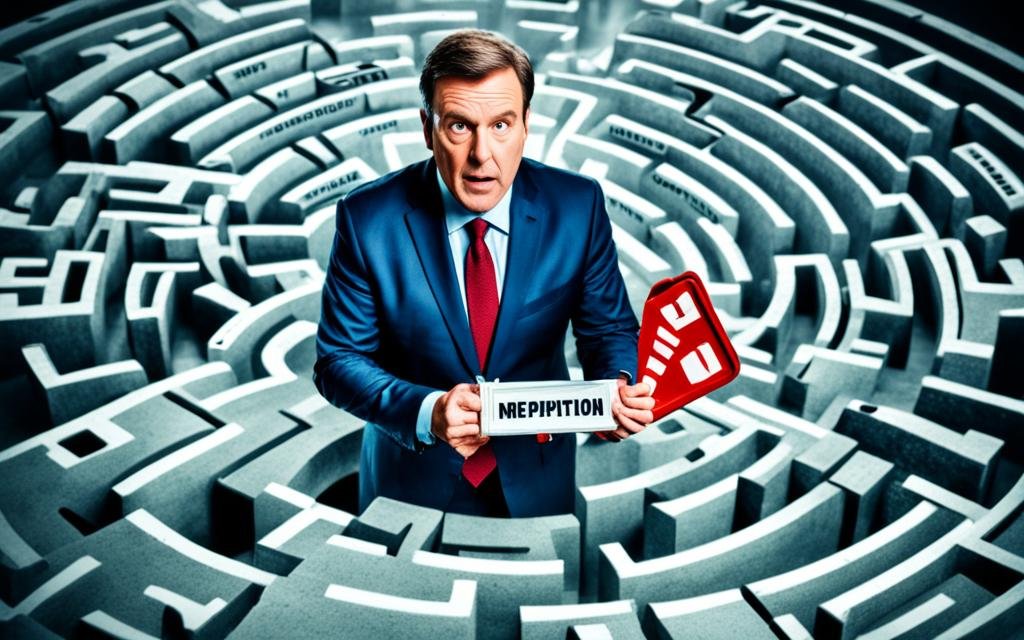In today’s digital world, managing your online reputation is key for politicians. Your online image can greatly affect your career. With social media and constant news, keeping a good online reputation is vital.
Political branding, crisis management, and watching social media are key to managing your online image. These steps help you stay on top of your online presence.

Having a good political reputation builds trust and credibility. This can help you win elections and push your political goals forward. But, using dishonest tactics can harm your reputation even more.
Long-term plans for managing your reputation focus on being consistently positive. They also prepare you for crises and negative reviews.
Managing online reviews is also crucial. With so many reviews and ratings online, it’s important to keep an eye on what people say. By talking to your audience and solving their problems, you can build a strong online reputation.
Key Takeaways
- Online reputation management is crucial for politicians in the digital age
- Political branding, crisis management strategies, and social media monitoring are essential components
- A positive political reputation can enhance trust and credibility, while deceptive tactics can backfire
- Long-term strategies aim to establish a consistent and positive reputation over time
- Online review management involves monitoring and responding to feedback from constituents and the public
The Importance of Online Reputation for Politicians
In today’s digital world, having a good online reputation is key for politicians. Most people look up information online, so what they see online can greatly affect a politician’s career. Tools for monitoring online reputation and digital PR are vital for handling risks in politics.

Politicians often face attacks from their opponents online. Negative reviews, comments, and blogs can change how people see them. It takes a lot of time to build a good reputation, but one bad comment can ruin it. Online reputation management services help remove negative info about politicians online.
“Social media plays a crucial role in shaping the public perception of politicians. People are using social platforms and the internet extensively before making important decisions.” – Sevenstar Websolutions
Being active on social media is important for politicians’ online reputation. It helps them connect with voters and be more visible. In fact, many adults use social media to support their political views or encourage others to act on issues.
| Online Reputation Management Strategy | Benefit for Politicians |
|---|---|
| Responding to negative information in a reasoned manner | Demonstrates professionalism and helps control the narrative |
| Creating a website with SEO management | Allows politicians to control the information available online |
| 100% response rate on social media comments | Shows active engagement with voters and builds trust |
| Avoiding engagement with internet trolls | Prevents further escalation of inflammatory rhetoric |
An effective strategy for managing online reputation can help politicians deal with false claims, old legal issues, and fake bad reviews. This means always keeping an eye on what’s said online, tracking negative stories, and acting to remove bad content. Companies like NetReputation.com and Sevenstar Websolutions offer services to help politicians handle these issues and improve their image.
In politics, where social media can quickly damage a reputation, managing your online image is crucial. By actively managing their online reputation, politicians can share their message widely, gain support, avoid negative publicity, and build a positive image with their voters.
Understanding Confirmation Bias in Political Reputation Management
Confirmation bias is key in political reputation management. It’s when people look for and remember info that fits their beliefs. This bias shapes how people see and react to news about politicians.

How Confirmation Bias Affects Political Perceptions
Confirmation bias greatly impacts how we see political figures. Supporters tend to pick and believe info that backs their views, ignoring the rest. This can warp their view of a politician’s reputation.
Studies show that people stick to their beliefs, especially in news choices. Media often leans towards certain views, making bias worse.
“Confirmation bias influences people to promote positive aspects of their chosen party, disregarding negative information.”
Here’s how confirmation bias affects political views:
- 37% of people in the UK trust social media for news, says Ofcom in 2019.
- Search engines and social media focus on political news, especially before elections.
- People click more on news at the top of search results, showing SEO’s role in politics.
Overcoming Confirmation Bias in Political Messaging
To fight confirmation bias, strategies that challenge beliefs are key. Creating content for a wide audience helps. This way, politicians can make people think more deeply.
Using social media to talk directly with people is another way to beat bias. Being open and honest can win trust, even with those who disagree. Keeping an eye on social media and answering concerns quickly can lessen bias’s effect.
| Strategy | Description | Benefits |
|---|---|---|
| Neutral Content Creation | Make content that’s fair and reaches more people | Encourages thinking and looking at different views |
| Social Media Engagement | Keep an open conversation with people on social media | Builds trust and respect, even with differing opinions |
| Sentiment Monitoring | Watch social media feelings and answer quickly | Lessens confirmation bias’s effect on reputation |
Knowing about confirmation bias and how to beat it helps politicians improve their online image. This way, they can shape public opinion better.
The Role of Social Media in Political Reputation Management
Social media is now key for politicians to talk to voters, shape how people see them, and keep a good online image. With lots of people talking politics on sites like Twitter, Facebook, and Instagram, keeping an eye on social media is vital for politicians.

Engaging with Constituents on Social Media Platforms
Social media lets politicians talk directly to voters. They can join in on conversations, answer questions, and share news. This makes them seem open and reachable, builds trust, and lets them share their main messages.
Politicians like Alexandria Ocasio-Cortez are great at using social media. They talk to followers, answer comments, and share what they do every day. This real talk builds a strong bond with voters and helps them understand what people think.
Monitoring Social Media for Potential Reputation Threats
Social media is great but can also be risky for politicians. Bad comments and false info can spread fast, hurting a politician’s image. That’s why keeping an eye on social media is important.
Politicians watch social media closely to spot and deal with threats fast. They track mentions of their name and important topics. By acting quickly on negative comments or wrong info, they can lessen the damage to their reputation.
Leveraging Social Media for Positive Reputation Building
Politicians can also use social media to build a good name. By posting useful, interesting, and real content, they can show off their wins, values, and brand.
Good ways to build a positive image on social media include:
- Sharing real-life stories that make the politician seem more human
- Talking about their big wins and how they help people
- Having smart talks on big issues and showing they know what they’re talking about
- Working with influencers to spread good news
- Encouraging followers to share their own stories and support
By using these methods and watching their social media, politicians can manage their online image well. They can build a strong, positive view among their voters.
Crisis Communication Strategies for Politicians
Today’s digital world makes politicians vulnerable to reputation damage from scandals and negative news. It’s key for them to have solid crisis communication plans. These plans should detail how to handle threats and lessen the blow of bad news online.

Developing a Crisis Communication Plan
Politicians need a detailed crisis communication plan to handle reputation crises well. This plan should cover:
- Identifying crisis scenarios and their causes
- Creating a crisis team with clear roles
- Writing messages for different crisis situations
- Setting up systems to spot early crisis signs
- Outlining how to communicate inside and outside during a crisis
With a solid plan, politicians can act fast and well in crisis, reducing the harm to their online image.
Responding to Negative Press and Scandals
When hit with scandals or bad press, politicians must act quickly and openly. Here’s how to manage these situations:
- Admit the issue and take blame when right
- Give clear info to calm the public
- Show empathy for those affected
- Share steps to fix the issue and stop it from happening again
- Use social media to talk directly with people and shape the story
“In times of crisis, it is not the size of the army that matters, but the quality of leadership and the strength of character.”
Former President Barack Obama’s team was great at tracking news in real-time. They could respond well during big moments like the Osama bin Laden raid. By keeping an eye on the media and giving clear, honest answers, politicians can lessen the damage from bad news and keep public trust.
| Crisis Communication Metric | Importance |
|---|---|
| Response Time | Quick action helps stop negative feelings from spreading |
| Transparency | Being open and honest builds trust with the public |
| Consistency | Keeping messages the same on all platforms stops confusion |
By using strong crisis communication strategies and being open and real when facing negative press, politicians can safeguard their online image. This helps them keep the trust of their supporters.
Proactive vs. Reactive Approaches to Online Reputation Management in Politics
In today’s fast-paced politics, having a good online reputation is key to success. Politicians can choose to be proactive or reactive in managing their online image. Being proactive means you actively shape your online image. Reactive means you deal with issues as they come up.

Being proactive means regularly talking to people on social media, sharing good news, and being open. This builds trust with voters and stops problems before they start. It also lets you control the story early on.
“A proactive approach to online reputation management is essential for politicians. It’s about building a positive image consistently, rather than just putting out fires when they happen.” – Sarah Johnson, Political Strategist
Reactive reputation management is crisis-focused, dealing with negative content or scandals right away. While it’s needed sometimes, relying on it too much can hurt your reputation for a long time. Without a base of good content and connections with people, it’s harder to fix bad news.
| Proactive Reputation Management | Reactive Reputation Management |
|---|---|
| Consistent monitoring and shaping of online image | Addressing issues as they arise |
| Engaging with constituents regularly | Responding to negative content or scandals |
| Sharing positive news and accomplishments | Implementing immediate solutions to crises |
| Maintaining transparency and authenticity | Focusing on short-term damage control |
To manage your online reputation well, mix proactive and reactive strategies. A strong proactive base helps you handle challenges better. Remember, your online presence is key for connecting with voters and shaping how people see you.
Online Reputation Management for Politicians: Key Components and Strategies
In today’s digital world, managing your online reputation is key for politicians. They need to keep an eye on what people say online about them. By using smart strategies, politicians can gain trust, get noticed in their area, and keep a good image.

There are a few main parts to good online reputation management for politicians. These include making good content, using SEO for political sites, and handling online reviews. Let’s look at each part more closely.
Content Creation and Optimization
It’s important for politicians to make and share good content often on their websites and social media. This helps them connect with people and stay visible online. By sharing content that matters to their community, they show they care and know what’s going on.
“71% of people believe that it takes years to build a good reputation, but a single negative comment can ruin it.”
Politicians should focus on local issues and speak to their audience. Using the right keywords helps their content show up more in search results. This makes it easier for people to find and see their message.
Search Engine Optimization (SEO) for Political Websites
SEO is key for getting noticed online, bringing more visitors to a site, and understanding what people like. By making their sites search-friendly, politicians can make sure their content is easy to find when people look for candidates and issues.
- 63% of voters check out candidates online to make up their minds.
- SEO helps politicians understand what their audience likes, letting them make content that hits the mark.
To boost their SEO, politicians should do keyword research, optimize their pages, and get links from trusted sources. Also, making their site work well on mobiles and loading fast can improve user experience and keep people around longer.
Online Review Management and Response Strategies
What people say online can really affect a politician’s image, with 85% looking to online reviews to decide on candidates. Keeping an eye on reviews and answering them well shows you’re listening and can change opinions.
| Statistic | Percentage |
|---|---|
| Individuals who trust online reviews more than what friends say | 90% |
| People more likely to believe the bad things they read online | 78% |
When answering reviews, politicians should stay professional and caring. Acknowledge concerns and offer solutions when you can. This way, they can earn trust and loyalty from the public.
In summary, good online reputation management for politicians means focusing on making content, using SEO, and handling reviews well. By doing these things, candidates can improve their online image, connect with voters, and build a strong reputation that people respect.
Reputation Repair Tactics for Politicians Facing Negative Online Sentiment
In today’s digital world, a politician’s online image is crucial. Social media and the 24/7 news cycle can quickly turn negative opinions into a big problem. Online stories can change public views and affect election results. That’s why having a plan for fixing a bad online image is key.

First, find out why people are saying bad things. Use tools and analysis to spot the problem. Then, tackle the issue directly. Releasing good news can help balance out the bad news over time.
It’s also vital to talk openly about real concerns with honesty, understanding, and action. Saying sorry and fixing mistakes can help rebuild trust. Responding quickly to bad news is crucial for fixing a reputation.
“Reputation repair is not a one-time fix. It requires ongoing effort and a commitment to transparency and authenticity.” – Political Strategist
Fixing a reputation isn’t just up to one person. A skilled digital team is key for keeping a good image. They make sure messages are clear on all digital platforms, which builds trust. They also watch for and deal with online issues early.
| Reputation Repair Tactic | Effectiveness |
|---|---|
| Addressing legitimate concerns with transparency and action | High |
| Tactically releasing positive content to balance search results | Medium |
| Collaborating with experienced online reputation management firms | High |
Working with online reputation management firms can offer valuable advice and strategies. These firms know how to fix online images and have the tools to do it.
In conclusion, fixing a bad online image is crucial for politicians. By finding the cause, being open, and having a good team, politicians can regain trust and boost their online image. Remember, fixing an online reputation takes time and effort and needs a real commitment to being true and proactive.
The Importance of Transparency and Authenticity in Political Reputation Management
In today’s digital world, being open and real is key for politicians. People want leaders who speak truthfully, showing both good and bad sides. By sharing what they do, decide, and why, leaders gain trust and respect from their supporters.

Being real in how they talk is vital for politicians to gain trust. When they connect with people on a personal level, showing they understand voters’ hopes and fears, they build a stronger bond. This realness can make voters happier, with studies showing a 55% boost in approval.
Building Trust with Constituents through Authentic Communication
To earn trust, politicians must be real in all they do, from social media to speeches and community events. Being open and true, even when criticized, helps leaders build stronger ties with their supporters. This leads to more loyal voters.
“Authenticity is the alignment of head, mouth, heart, and feet – thinking, saying, feeling, and doing the same thing – consistently. This builds trust, and followers love leaders they can trust.” – Lance Secretan, leadership expert
Here are some ways to build trust through real communication:
- Sharing personal stories to seem more approachable
- Listening to what people say and responding directly
- Admitting wrongs and owning up to actions
- Staying true to your values and vision
Balancing Transparency and Strategic Messaging
Being open is important, but so is having a plan for your message. Politicians should talk about big issues and stick to their main values and goals. By being careful with their words and staying true to themselves, leaders can handle their online reputation well.
| Strategy | Impact on Voter Trust |
|---|---|
| Being genuine in communication | 55% increase in voter satisfaction |
| Sharing personal stories | 45% increase in voter connection |
| Actively participating in online forums and community events | 70% increase in voter trust |
| Addressing local issues online | 65% increase in voter loyalty |
By focusing on being open and real online, politicians can create stronger bonds with their people. This leads to more success in their political careers.
Online Reputation Monitoring Tools and Techniques for Politicians
In today’s digital world, politicians must be alert and proactive about their online image. Using advanced tools and techniques, you can keep an eye on your online image, see what people think, and act quickly to threats or chances. Here are key tools and methods to help you handle your political reputation:
Real-Time News Tracking and Analysis
Real-time news tracking is crucial for politicians. It lets you stay up-to-date with breaking news and react fast to important events. With these tools, you can watch media coverage, spot issues early, and make smart responses to protect your image or seize opportunities. For example, during the operation that led to Osama bin Laden’s death in 2011, President Barack Obama’s team used real-time news tracking to keep track of the story and respond well.
Sentiment Analysis in Media Coverage
Sentiment analysis tools are great for seeing how people react to news about you. They sort news and social media posts as positive, negative, or neutral. This helps you understand what people think of you. During the 2016 election, Hillary Clinton’s team used sentiment analysis to see how public opinion was changing and adjust their messages.

Competitive Analysis and Benchmarking
Competitive analysis means watching what your political rivals do online to stand out and beat them. By comparing your online work to your opponents in areas like engagement and sentiment, you can learn a lot. The Democratic Party, for instance, uses this to see what the other side is doing online and plan their own moves.
Let’s look at how some politicians use these tools and techniques:
| Politician | Real-Time News Tracking | Sentiment Analysis | Competitive Analysis |
|---|---|---|---|
| Barack Obama | Used during big events like the Osama bin Laden operation | Kept an eye on public feelings to make good responses | Looked at what others did to make his campaign stand out |
| Hillary Clinton | Watched breaking news to change her messages | Used sentiment analysis to make her outreach better | Compared herself to others to plan her strategy |
| Alexandria Ocasio-Cortez | Kept up with social media to talk to her people | Looked at feelings to tackle concerns and spread her message | Learned from others online to be different |
By using these tools and techniques, you can manage your online image well. You can handle threats and build a strong, positive reputation with your people and the public.
Conclusion: Navigating the Complexities of Political Reputation Management Online
In today’s digital world, managing your political reputation online is key to winning elections. Most Americans learn about elections online. So, politicians must know how to use the internet to shape how people see them and win votes. By keeping an eye on their online image, they can gain trust, avoid bad publicity, and spread their message far and wide.
But, managing your political image online is hard. Politicians face many challenges, like stopping false info and fighting voter bias. They need to stay alert and change their tactics often. Working with experts in social media, crisis management, and digital marketing helps. These pros can create plans that fit the candidate’s needs and goals.
To succeed online, being open, real, and listening to voters is crucial. Clear communication and quick responses to public opinion are vital. Using the latest tools and strategies for managing your online image helps build strong bonds with voters. In a world where one bad article can hurt a candidate, being proactive with your online reputation is a must for winning in the digital age.
FAQ
What is political reputation management?
Political reputation management is about shaping and protecting a politician’s image. It’s done through strategies for both short-term fixes and long-term building. The goal is to increase trust, credibility, and support from people.
Why is online reputation crucial for politicians?
In today’s digital world, a politician’s online image is key, especially during campaigns and elections. It lets them reach more people, get support, dodge bad news, and show a good side. Managing their online reputation helps them handle tough situations, spot problems, and fix them to keep a good public view.
How does social media impact political reputation?
Social media has changed politics, letting politicians recruit supporters, share ideas, and talk to people right away. By posting good and informative stuff often, they can shape the story and build a strong online image. Social media also lets them quickly tackle rumors and crises, preventing damage to their reputation.
What are some key strategies for managing a politician’s online reputation?
Important strategies include making content, managing crises, using tools to monitor, SEO, social media, and fixing a bad reputation. It’s key to create good content, talk to users on social media, watch online reviews, and answer feedback well. If there’s negative feedback, tactics like hiding bad reviews, showing strengths, and changing public opinion can help fix the image.
How can politicians build trust and credibility through reputation management?
Being open and real is crucial for trust and credibility. People like politicians who speak truthfully, showing both good and bad sides. Being true, even when criticized, builds stronger bonds and loyalty. It’s important to be open but also to share a clear message, focusing on values and vision while being honest.
What tools and techniques are used for monitoring a politician’s online reputation?
Tools and methods for watching a politician’s online image include tracking news in real-time, analyzing feelings, and comparing with others. Tracking news helps politicians stay on top of stories and react fast. Analyzing feelings shows what people think, and comparing with others helps see how they stand out or fall short.

0 Comments